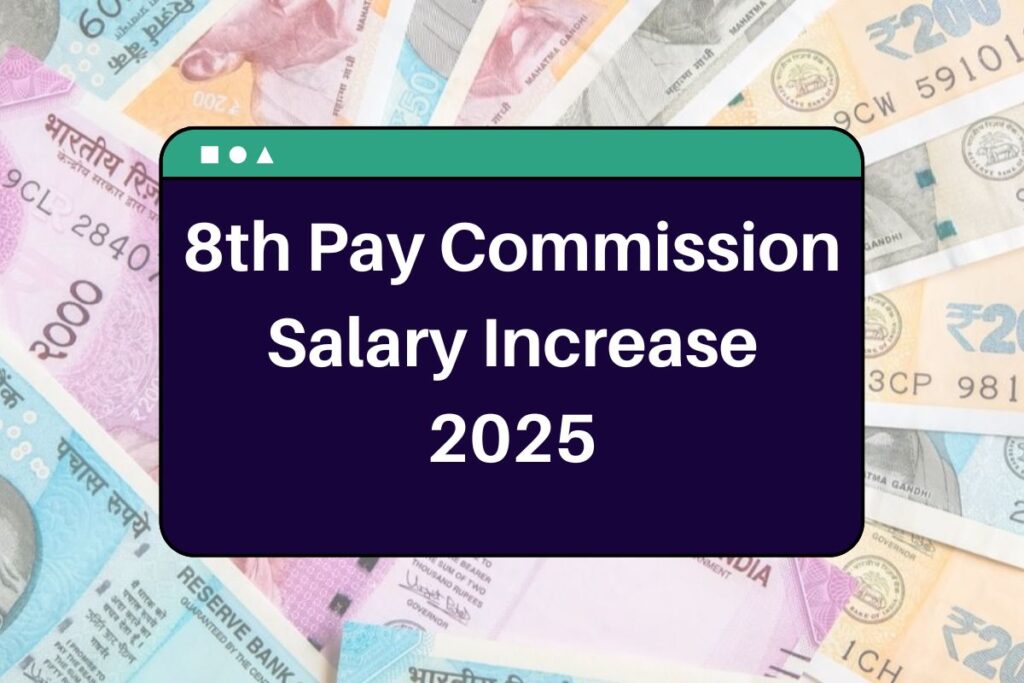Government employees’ and pensioners’ pay structure change is the subject of the eagerly anticipated 8th Pay Commission. Regarding suggestions for pay increases, benefits, and pensions, expectations are very high. Although there has not been a formal announcement, there is speculation that the next revision may take into account important adjustments such the minimum wage and fit factor, etc.
Even when the final report is sent in, the government need further time for assessment and execution due to the procedures of earlier pay commissions. Accordingly, 8th Pay Commission Salary Increase 2025 will not be put into effect until the beginning of 2027.
8th Pay Commission Salary Increase 2025
It is possible that central government workers and retirees who anticipate pay and pension increases starting in January 2026 will have to wait another year. This is due to the fact that the implementation of the 8th Pay Commission’s recommendations is probably going to take longer. Although the commission’s term will formally start in January 2026, reports suggest that the updated pension and compensation adjustments might not be implemented until early 2027.
Employees and pensioners will, however, receive a full year’s worth of arrears when the new pay schedule takes effect, they stated. According to a news, the commission may also produce an interim report prior to making the final recommendations, although the entire report will not be available until the end of 2026.
What is the 8th Pay Commission?
In India, the government appointed the 8th Pay Commission, which is in charge of updating the pension plans, allowances, and salaries of central government workers and retirees. It is the most recent of a succession of pay commissions established since India gained its independence with the intention of guaranteeing prompt and equitable pay changes in accordance with prevailing economic conditions, inflation, and the changing requirements of public employees.
Employees of the central government are anxious to learn how their pay will change when the 8th Pay Commission is implemented. Basic wage will rise by 25–30% as it is anticipated to be between 2.6 and 2.85. To update central government employees’ and pensioners’ salaries and benefits, the 7th pay panel used a fitment factor of 2.57 nearly ten years ago. These changes are important because they guarantee fair compensation structures while also improving the workforce’s financial stability and motivation.

8th Pay Commission Benefits 2025 What employees can expect?
Significant changes to the central Indian government employees’ pay structure are expected due to 8th Pay Commission. Although the specifics will be verified by the final recommendations, the following are the main advantages that workers may anticipate:
- Increase in Salary- Employees at all pay matrix levels might get a considerable raise in their base pay for the eighth pay commission, which could range from 20% to 35%. For government employees, this translates into higher take-home pay.
- The updated pay matrix- A new pay matrix that aligns remuneration with jobs and clarifies wage slabs will be implemented. Under the eighth pay commission pay matrix, this modification will represent a systematic approach to compensation increases.
- Adjustments for inflation- Periodic adjustments like Dearness Allowance (DA) will probably be a part of the 8th pay commission payment structure. This will assist keep salaries in line with inflation and preserve buying power.
- Improvements to Pensions- Lakhs of seniors are anticipated to live better lives due to the 8th Pay Commission’s improvements to the pension system. Allowances and other perks received after retirement will also be affected by changes.
- Fairness for Workers with Lower Incomes- To ensure equal distribution throughout the workforce, the commission may concentrate on giving lower-paid employees larger pay increases. For all employees, the eighth pay commission compensation slab will contribute to increased financial stability.
- A more balanced work-life schedule- The 8th Pay Commission will make government positions more appealing by implementing more flexible benefits and allowances, continuing the trend of bettering work-life balance.
- A higher level of job satisfaction- Government departments will gain from the anticipated pay increases and other perks, which are likely to increase job satisfaction and inspire people to provide their best work.
8th Pay Commission News 2025 Latest Update
- The new panel is anticipated to complete its recommendations within 15 to 18 months of its establishment, according a news. According to another news, the report is probably not going to be made public until the end of 2026, but it may also submit an interim report prior to making its final recommendations. Although the commission’s term will technically start in January 2026, the report suggests that the updated wage and pension changes could not be put into effect until early 2027. However, arrears for the whole 12-month period will be paid to employees and pensioners when the new pay scale is implemented.
- A 2% raise in Dearness Allowance (DA) for staff members has been approved by the national government. With this hike, the DA will receive 55% of their base salary instead of the existing 53%. Notably, other compensation components such as House Rent Allowance (HRA) and Travel Allowance (TA) would also increase as a result of this boost, as DA is updated every six months.
- A report claims that central government workers and retirees who were hoping for a pay and pension increase starting in January 2026 could have to wait another year. The prolonged time frame anticipated for putting the 8th Pay Commission’s recommendations into practice is the reason for this delay.
| Official Website | Click Here |
| Homepage | OFSSBihar.in |




Good news for Government employees